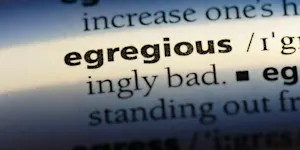What Makes This Word Tick
"Equivocal" is a word that dances on the line between meaning and misunderstanding. It suggests something open to more than one interpretation, which makes it a favorite in political speeches and mystery novels alike. Unlike its more blunt siblings, "unequivocal" or "clear," it thrives in ambiguity. It’s a bit of a chameleon, adapting to various contexts where certainty is out of reach.
If Equivocal Were a Person…
Imagine meeting Equivocal at a party. This is the guest who, when asked about their job or hometown, responds in such a way that you’re left with more questions than answers. Equivocal prefers to keep things mysterious and loves when others do the guessing game. The kind of person who would reply with "perhaps" or "well, it depends" to nearly every query.
How This Word Has Changed Over Time
Initially, "equivocal" was used in the 16th century to describe words or phrases that could be interpreted in multiple ways. Over time, its use broadened to describe situations or even people who were ambiguous or non-committal. Today, it retains that flexibility, often used in contexts ranging from legal jargon to everyday chit-chat.
Old Sayings and Proverbs That Use Equivocal
While not directly appearing in well-known proverbs, the spirit of "equivocal" shines through sayings like "sitting on the fence" or "playing both sides," embodying the essence of indecision and dual interpretations.
Surprising Facts About Equivocal
Here's a quirky tidbit: "equivocal" shares a root with "equivocation," the artful dodging Shakespeare’s characters often employ. It's a favorite word in literary circles, celebrated for adding a layer of intrigue and complexity to dialogue.
Out and About With This Word
Listen carefully, and you might hear "equivocal" at a city council meeting or in a CEO's annual report. It surfaces whenever clarity is elusive or intentionally avoided, making it a staple at political debates and during contentious interviews.
Pop Culture Moments Where Equivocal Was Used
Equivocal moments are a staple in pop culture cliffhangers, where finales leave audiences hanging with multiple possible outcomes. Think of television dramas where the last scene could mean both doom or salvation for the protagonist, all summed up with an equivocal smile.
The Word in Literature
In literature, characters speaking equivocal language often have something to hide. Think of the evasive answers given by Roger Chillingworth in Hawthorne’s "The Scarlet Letter." Authors use this word to deepen plots and engage readers in a guessing game of intentions.
Moments in History with Equivocal
The 1960 U.S. presidential debates between Nixon and Kennedy are a classic example. With each candidate often giving ambivalent statements, parsing their intent became part of the public’s political education. Equivocal answers kept voters on their toes.
This Word Around the World
In French, the equivalent might be "équivoque," capturing the same sense of ambiguity. In German, you'd hear "mehrdeutig," which is similarly used in contexts where exactness is lacking. The nuance may shift, but the heart of the word remains: open to interpretation.
Where Does It Come From?
Rooted in the Latin "aequivocus," combining "aequi-" meaning equal or same, and "vocus," meaning voice. The etymology whispers about equal voices in its meaning, perfectly fitting its nature of ambiguity and multiple interpretations.
How People Misuse This Word
Sometimes people confuse “equivocal” with just being unclear or vague, but true equivocation implies there’s intention or opportunity for dual meanings, not just a lack of clarity.
Words It’s Often Confused With
Ambiguous: While both suggest unclear meanings, "ambiguous" is more about a lack of clarity without the intentional duality "equivocal" implies.
Ambivalent: Often mistaken for synonymy, but "ambivalent" describes conflicting emotions rather than mixed messages.
Vague: Broadly unclear, without the double-sided nature of being equivocal.
Additional Synonyms and Antonyms
Synonyms include ambiguous, doubtful, and uncertain. Antonyms would be unequivocal, clear, and straightforward.
Want to Try It Out in a Sentence?
When the CEO gave an equivocal answer about future layoffs during the board meeting, it left many employees feeling uneasy about their job security.
















